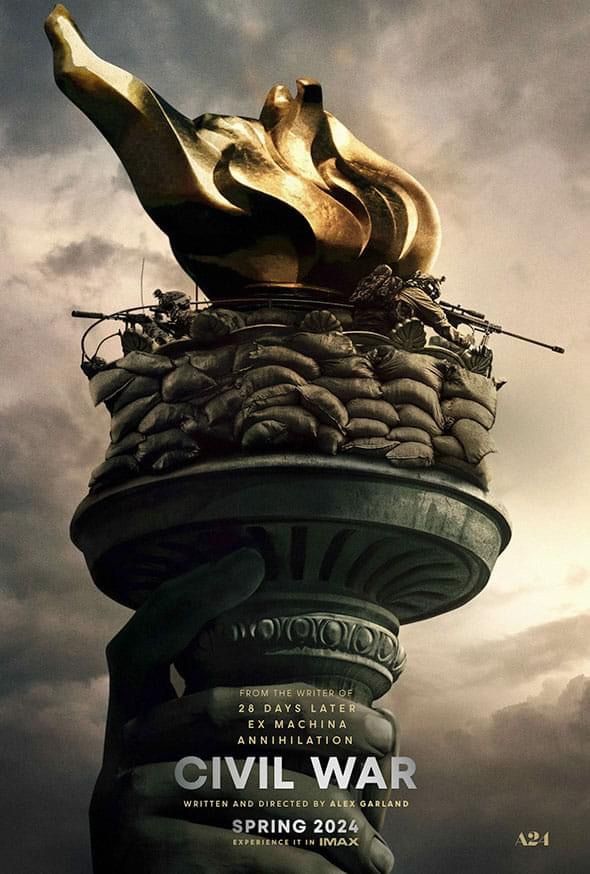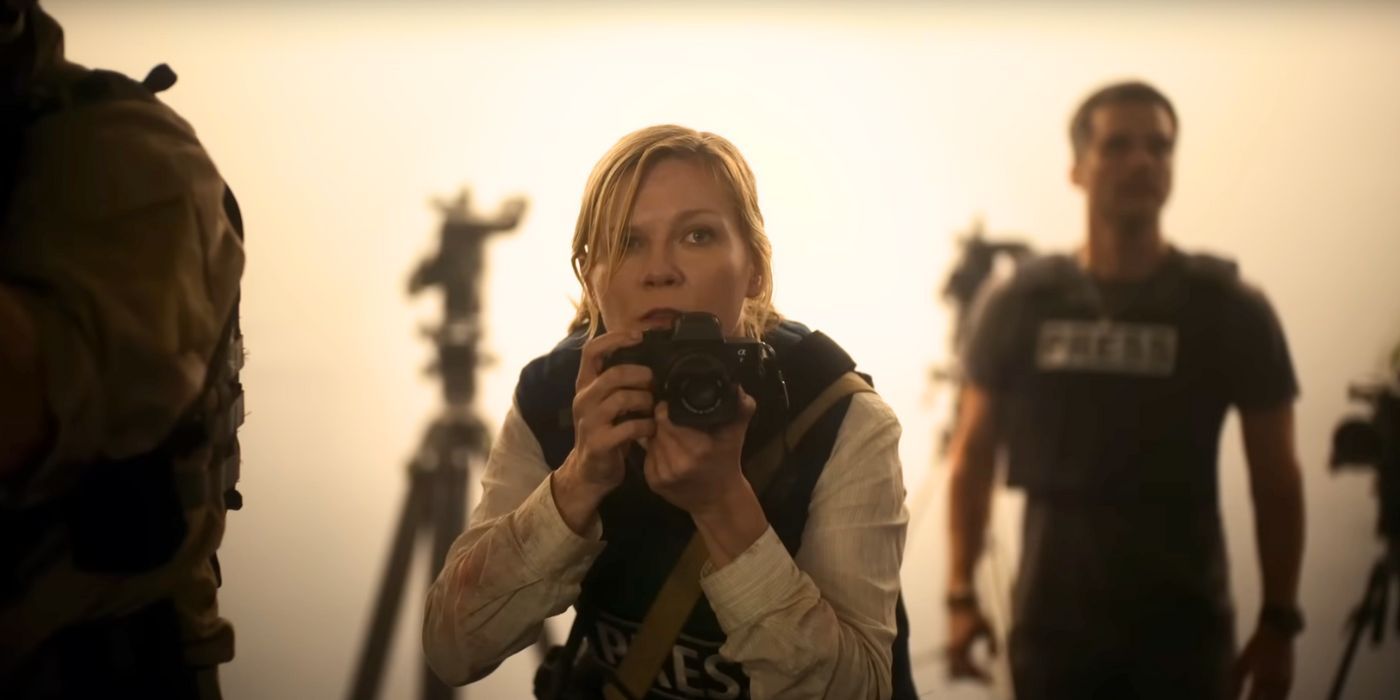The Big Picture
- Films like
Civil War
spark important discourse in our changing media landscape. - Alex Garland’s apolitical stance challenges critics to engage with the film’s text.
- The ambiguity of
Civil War
reflects on the murky nature of war, blurring lines between good and evil.
When a divisive film like Civil War comes along, it is worth appreciating, as the passionate discourse among the film community serves as a reminder that films are essential forms of media in a rapidly changing media and cultural climate. For a provocative filmmaker like Alex Garland, apathy is the enemy of artistic success. If his recently released dystopian war thriller failed to trigger anger and frustration among a cohort of critics, then something went awry. However, a large sector of negative criticism aimed at Civil War gravely misses the point of Garland’s film. Even worse, many critics have refused to engage with the text of the film due to Garland’s decision to take an apolitical stance on the film’s subject. You’re not supposed to be aware of Garland’s politics, as the nature of the film’s dystopian political climate is abstractly eerie. If anything, fixating on broad politics instead of the photojournalists on the battlefield who are coming into direct contact with the hellish backdrop of war is an absurd proposition.
The fanfare surrounding Civil War is two-pronged. The film’s subject evokes a toxic political climate that has affected contemporary society. It’s understood that the content of Garland’s film could feasibly be from a future not too far from the present day. Being a Presidential Election year, any film concerned with the national divide will call attention to itself. From a cinematic perspective, Civil War represents a major leap in scale for the acclaimed independent studio, A24. With a $50 million budget, Civil War is the studio’s most expensive project to date. The studio, often celebrated as a luxury brand of films by cinephiles, is not known for grand, operatic war epics, but Garland, an A24 staple, keeps the film grounded. Civil War follows a team of reporters, veteran photojournalists Lee (Kirsten Dunst) and Joel (Wagner Moura), senior journalist Sammy (Stephen McKinley Henderson), and plucky newcomer Jessie (Cailee Spaeney), traveling across the United States during a rapidly escalating Second American Civil War tearing the nation to shreds.

Civil War
The film follows events in the U.S. during a civil war. Government forces attack civilians. Journalists are shot in the Capitol.
- Release Date
- April 12, 2024
- Director
- Alex Garland
Alex Garland Does Not Wear His Politics on His Sleeve in ‘Civil War’
The inherent nature of a civil war is that two parties are divided to such a degree that they are left with no other option besides disputing their differences through warfare. In such a divisive period, individuals are forced to take one side or the other. When viewers discovered that Alex Garland chose to tell the story from a neutral and apolitical perspective, some believed he was taking the easy way out — avoiding a hardline political statement to appease a mass audience. The writer-director’s neutral voice drew the ire of critics, chalking up this decision as an act of cowardice by Garland. Critics’ frustration with Garland not explicitly wearing his politics on his sleeve clouded them from engaging with the text. It’s one thing to fail to connect with Garland’s vision, but to suggest that Civil War is an empty reflection on the horrors of war and our turbulent political climate is unwarranted.
A film that brushes on thorny political topics is expected to be an active work of political commentary — think of Oliver Stone‘s left-leaning confrontational rebukes of American foreign policy and the military-industrial complex in Platoon and JFK. In the case of explosive blockbusters that fetishize military combat and express unabashed jingoism, notably films by Michael Bay, they evoke the spirit of right-wing philosophy. There’s nothing innately wrong with using the film medium to convey a message, but when a filmmaker solely relies on didactic storytelling, a film becomes less of an art form and more of a soapbox. In relation to Civil War, reprimanding Garland for not being explicitly political in his storytelling comes across as a misread of the purpose of film as an art form. Considering that the film’s subject loosely parallels recent events, including civilian unrest in the streets, abuse of executive power, and the January 6th insurrection, one’s personal politics interfering with the text interpretation is understandable, but it undermines Garland’s vision.
‘Civil War’ Engages With the Emotional Complex of Living In an Apocalyptic Setting
In an interview with The Atlantic, Garland said that demanding a film be explicit in its political ideology is “unethical.” Civil War operates as a comment on the psychological complex of polar extremism in everyday life, citing that his film “comes out of anger.” The film is refreshingly devoid of hand-wringing and exhausting political theory. Instead, Garland focuses on the mood and tenor of a nation pulled apart. The abandoned parking lots, empty streets, and ravaged stadiums operate as liminal spaces for the characters and the audience. These familiar-looking places being afflicted by combat emphasize the jarring existence of a civil war. Despite Garland’s “anger” comments, and the series of white-knuckled set pieces, the crown jewel scene being Jesse Plemons asking “What kind of American are you?”, Civil War demonstrates an unexpected serenity against the backdrop of all-out conflict. The most resonant sequences occur when the principal characters camp out in the middle of the country at night. As gunfire echoes through the night, Lee and Jessie look for comfort amid the hellish reality. In a scene where Jessie buys Lee a dress at a local shop obliviously unaffected by the war, the film manages to reflect on the loss of simplistic innocence just through a shot of Lee gazing into a mirror.
War, as the most dangerous and barbaric form of competition, comes down to one regimented side versus another — like a sports match in that sense. Civil War, however, distorts which party is on what side, and it is ambivalent toward identifying the righteous side. Anecdotally speaking, as I was leaving my screening, a couple inquired about my thoughts on the film, and their main point of concern was that they couldn’t comprehend the details of the war. This is another throughline in criticism of Civil War — no one knows who is fighting who. Anything that is hinted at, such as a unification between Texas and California, states with diametrically opposed political ideologies, left some viewers incredulous. Many critics have cited the vagueness of the machinations of the war as another sign of Garland’s cowardice and lack of engagement with American politics. On a purely artistic level, the ominous nature of the fictionalized conflict feeds into the eeriness that surrounds the journalists’ odyssey across the nation. Their adventure is not born out of the pursuit of social justice, but rather, to fuel their innate journalistic adrenaline by capturing harrowing snapshots of the war and obtaining an interview with the disgraced unnamed President (Nick Offerman).
The Political Ambiguity of ‘Civil War’ Feeds Into the Murkiness of War
On The Big Picture podcast, Garland found the ambiguity of the story practical, stating, “I think those things did not need to be explained because I don’t meet people … who really need that explained,” concerning the specifics of the civil unrest. While it’s tempting to read this as a cop-out on Garland’s part, this rationale condenses the scope of the film. Along their journey, the group devolves from journalism to survivalism. Garland’s commitment to framing the story from their perspective eases the pressure to communicate a grandiose political statement. When you’re running for your life or caring for a colleague after they’ve been inflicted with gunshot wounds, you don’t have time to preach profound ideology surrounding war.
Based on the historical precedent of a civil war within the United States, we imagine that a modern-day internal conflict would feature sides split between Democrats and Republicans, the two major parties that have never felt more divided. Alex Garland presupposes that maybe our clearly defined ideas of political ideology would collapse under the fatalistic pressure of a national revolt. In the throes of a war-torn America, our vision will likely be distorted, with the righteous and the evil blending with each other. “Extremism encourages extremism,” Garland said on The Big Picture. From his worldview, this is how the events of the film transpired. By bemoaning the lack of explicit political hand-wringing in his film, we are headed toward a similar fate in real life. For people who want their politics valorized on screen, they’ll have to look elsewhere, as Civil War approaches its dicey subject by attempting to mirror the psychological complex of a conflict that is too monumental to properly consume. Garland’s passive voice implies indifference to provocation, but the divisive reception to his film suggests that the stubbornness of ideology was challenged.
Civil War is playing now in theaters across the U.S.


